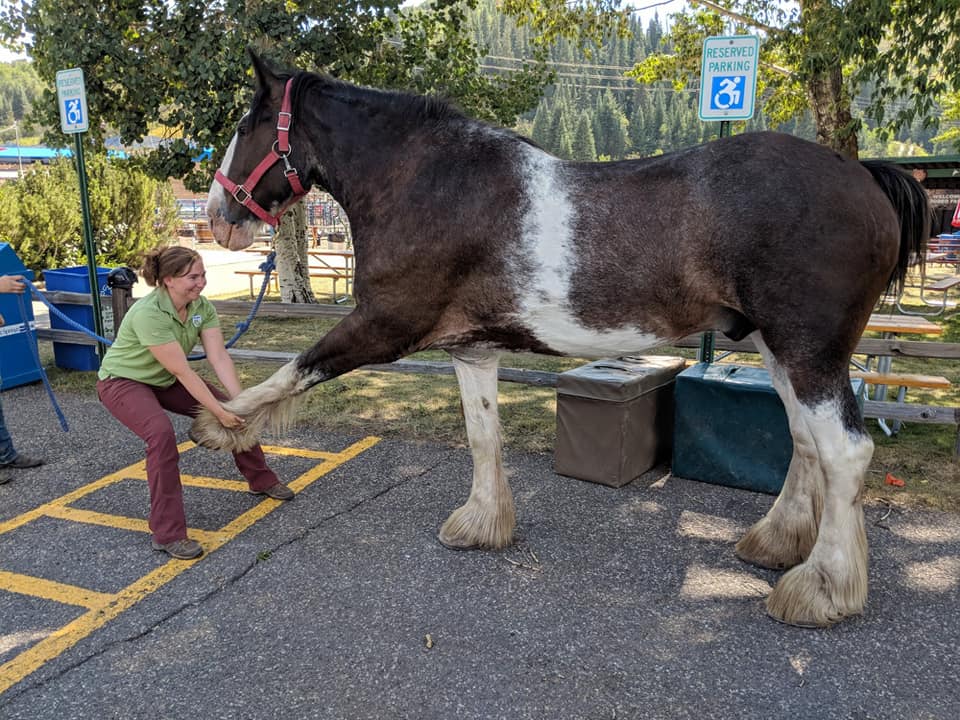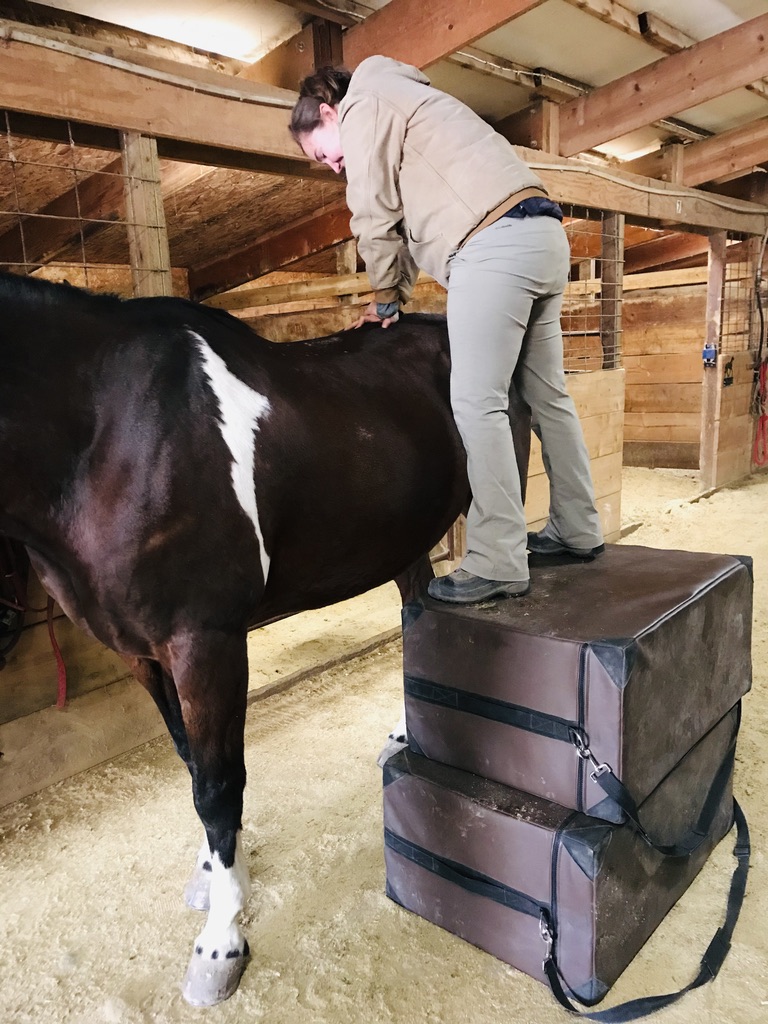As horse owners, we want the best for our equine companions, and one way to help maintain their health and well-being is through equine chiropractic care. This holistic approach focuses on the musculoskeletal system and aims to optimize horses' performance and comfort.
Equine chiropractic care is a non-invasive, drug-free treatment that works harmoniously with traditional veterinary care to promote alignment, mobility, and physical balance. Whether your horse is an athlete, a working partner, or a cherished companion, chiropractic care offers a natural way to enhance their comfort, activity level, and overall vitality.
What is Equine Chiropractic Care, and How Does It Benefit Horses?
Equine chiropractic care involves the manipulation of the horse's spine and musculoskeletal system to correct alignment and improve overall function. By addressing misalignments and restrictions, chiropractic treatment can enhance mobility, relieve pain, and promote recovery from injuries.
This therapy focuses on the evaluation and manipulation of a horse’s spine and musculoskeletal system to improve alignment, mobility, and overall function. This specialized care involves gentle, targeted adjustments to address misalignments, often referred to as "subluxations," which can interfere with the horse’s nervous system and physical performance.
The benefits of equine chiropractic care can aid horses of all breeds, disciplines, and life stages. By relieving pain and restoring proper alignment, chiropractic adjustments can:
- Enhance Mobility: Improved spinal alignment helps horses move more freely, with greater comfort and ease.
- Relieve Pain: Addressing areas of tension and restriction can reduce discomfort associated with injuries, overuse, or poor posture.
- Support Recovery: Chiropractic care can accelerate healing from injuries by improving circulation and reducing inflammation.
- Improve Posture: Proper alignment promotes healthier posture, reducing strain on muscles, joints, and ligaments.
- Boost Athletic Performance: Horses involved in demanding activities like jumping, dressage, or racing often experience improved flexibility, strength, and range of motion after chiropractic adjustments.
- Reduce Stress: By addressing physical discomfort, chiropractic care can alleviate stress on the body, enhancing the horse’s overall well-being.
Signs or Symptoms Indicating a Horse Might Benefit from Chiropractic Care
Horses are highly sensitive animals; even subtle changes in their behavior or physical performance can indicate discomfort or underlying issues.
Horse owners should look for symptoms such as:
- Changes in behavior (e.g., reluctance to work, fussiness during saddling)
- Poor performance or decline in athletic accomplishments
- Uneven wear on hooves
- Stiffness, especially after exercise
- Difficulty with transitions (e.g., picking up leads)
- Uneven muscle development
- Sensitivity to touch or specific areas of the body
If your horse displays any of these symptoms, consulting with an experienced equine chiropractor can help address potential issues and improve your horse’s comfort and performance. Early intervention can prevent minor problems from becoming major concerns, supporting your horse to remain healthy and active.

How Does Equine Chiropractic Treatment Differ from Traditional Veterinary Care?
While traditional veterinary care often focuses on diagnosing and treating illnesses or injuries through medical and surgical interventions, chiropractic care emphasizes the biomechanical health of the horse. Chiropractic treatment aims to correct functional issues by realigning the spine and joints rather than just addressing symptoms. These two approaches can complement each other, providing a holistic method for maintaining equine health.
Integrating Equine Chiropractic Care with Other Veterinary Treatments
Equine chiropractic care can be seamlessly integrated with other veterinary treatments such as physiotherapy, massage therapy, and traditional veterinary interventions. By working closely with veterinarians, chiropractors can provide a more comprehensive approach to a horse's health, addressing both structural and functional concerns.
This therapy is an effective method for addressing a variety of conditions that affect a horse's musculoskeletal health and overall performance. Equine chiropractors frequently address conditions such as:
- Back pain
- Neck pain or stiffness
- Sacroiliac joint dysfunction
- Pelvic misalignment
- Muscle spasms
- Postural imbalances
- Recovery from musculoskeletal injuries
Frequency of Chiropractic Care for Horses
The ideal frequency of chiropractic treatments for horses depends on individual needs and various factors, including their age, activity level, health status, and medical history. Working with an experienced equine chiropractor guarantees that your horse receives care tailored to their specific requirements.
Factors Influencing Frequency:
- Age and Health Status: Older horses or those with chronic conditions may require more frequent adjustments to maintain comfort and mobility. Younger or healthier horses might need less frequent care.
- Type and Intensity of Work: Horses engaged in regular training, competition, or physically demanding activities like jumping or dressage often benefit from adjustments every 4–8 weeks to keep their bodies performing optimally.
- Previous Injuries or Issues: Horses recovering from injuries or with a history of musculoskeletal problems may need more frequent sessions to address compensatory movements and prevent re-injury.
- Response to Treatment: A horse’s response to chiropractic adjustments is a key determinant. Some may show significant improvement after one or two sessions, while others may require ongoing care for maintenance.
General Recommendations:
- Performance Horses: Regular chiropractic evaluations every 4–8 weeks can help prevent issues, maintain flexibility, and optimize performance.
- Pleasure or Retired Horses: Horses with lighter workloads or those not actively competing may benefit from adjustments on a less frequent basis, such as quarterly or as needed based on observed stiffness or discomfort.
Routine chiropractic care is not just reactive but can be an essential part of preventive care, ensuring your horse remains comfortable, active, and free from avoidable stress or strain. Consulting with your veterinarian will help establish the right schedule for your horse’s unique needs.
What to Expect During an Equine Chiropractic Session
During an equine chiropractic session, owners can expect the following:
- Initial Assessment: The chiropractor will perform a thorough evaluation, which may include observing the horse in motion and conducting physical examinations.
- Treatment: The chiropractor will apply manual techniques to specific areas, usually involving gentle adjustments. Most horses tolerate this well and may show immediate signs of relief.
- Post-treatment Recommendations: After the session, the chiropractor may provide advice on follow-up care, stretching exercises, or lifestyle modifications.
Qualifications to Look for in an Equine Chiropractor
When seeking an equine chiropractor, look for:
- Credentials from recognized institutions such as the American Veterinary Chiropractic Association (AVCA) or the International Veterinary Chiropractic Association (IVCA).
- Experience and specialization in equine health.
- Well-rounded veterinary knowledge, ideally with a background in veterinary medicine.
- Laws regarding animal chiropractic vary by state. However, it is illegal for anyone that is not a DVM or Doctor of Chiropractic (DC) that has undergone animal specific chiropractic or spinal manipulation training to call themselves an animal chiropractor or perform spinal manipulation on an animal.
Certification Importance: AVCA/IVCA

Having an AVCA/IVCA certified chiropractor is essential for ensuring that the practitioner has undergone the appropriate training and adheres to established standards of practice. These certifications confirm that the chiropractor is knowledgeable about equine anatomy and the principles of chiropractic care, reinforcing your confidence in their abilities to care for your horse.
Potential Risks or Side Effects of Equine Chiropractic Care
While equine chiropractic care is widely regarded as a safe and effective treatment, it is important to be aware of potential risks, even if they are uncommon. Understanding these risks helps horse owners make informed decisions and ensures the best outcomes for their equine companions.
Potential Risks:
- Mild Soreness: Horses may experience mild muscle soreness or stiffness after an adjustment as their bodies adapt to the changes in alignment. This is typically short-lived and resolves within a day or two.
- Temporary Behavioral Changes: Following a chiropractic session, some horses may exhibit changes in behavior, such as increased sensitivity or restlessness, as they adjust to their improved mobility and alignment.
- Rare Complications: In very rare cases, improper adjustments or excessive force can result in more serious complications, such as tissue damage or joint strain.
How to Minimize Risks:
- Choose a Qualified Chiropractor: As mentioned above, always work with a certified equine chiropractor who has specialized training and experience in working with horses.
- Communicate with Your Veterinarian: Collaborate with your horse’s veterinarian to make sure chiropractic care is appropriate and part of a holistic health plan.
- Monitor Post-Treatment Response: Observe your horse after an adjustment and communicate any concerns to your chiropractor or veterinarian.
Improving Performance and Quality of Life through Regular Chiropractic Care
Regular chiropractic care can significantly enhance a horse’s performance by increasing its range of motion, reducing pain, and promoting better overall biomechanics. This can lead to improved athletic performance and a happier, more comfortable horse in daily life.
In conclusion, equine chiropractic care can be vital to maintaining your horse's health and enhancing their performance. Recognizing the signs that your horse may benefit, understanding the treatment process, and working with qualified professionals can lead to a happier, healthier horse. If you have more questions or are interested in scheduling a session, you can call us directly at (970) 368-3125, or you can email us at [email protected]. Don't forget to follow us on social media Facebook, Instagram.
